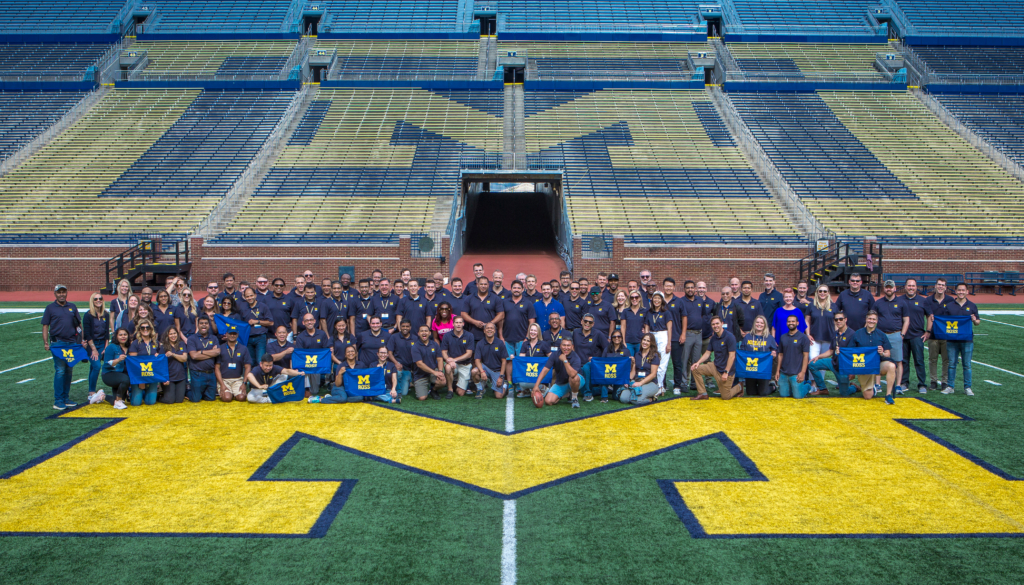
Michigan Ross’ EMBA Class of 2024 poses for a photo on the field at Michigan Stadium. (Courtesy photo)
Q&A WITH ARI SHWAYDER
Michigan Ross’ Executive MBA ranked No. 7 in Poets&Quants For Execs’ 2023 composite EMBA ranking of U.S. programs. It also ranked seventh in U.S. News’ ranking of U.S. EMBA programs, 10th for stand-alone U.S. programs in the Financial Times and fifth in Fortune Magazine’s ranking. (Our composite ranking is based on three above rankings giving a 40-percent weight to U.S. News and FT and 20% weight to Fortune.)
This week, as part of our EMBA Spotlight series, we’re diving deep into the two Michigan Ross cohorts. We spoke with Ari Shwayder, LEO Lecturer of Business Economics and Public Policy, who became the faculty director for the Ross EMBA last summer.
Our conversation, presented below, has been edited for length and clarity.
Why did the role of faculty director for Executive MBA appeal to you?
I have been teaching in the Executive MBA Program since about 2017,and I definitely enjoyed it. I found that I like teaching the more mature students. I certainly love teaching undergrads, but teaching even the full time MBA program is different than the undergrads and teaching the Executive MBA students is different than the full time MBA students. The executive students that have more experience bring more to the classroom, I learn more from them and I think the students learn more from each other. It just makes for a richer classroom environment.
So when the person who had been the director of the program moved on to a different role, I thought it sounded interesting to get more involved.
What are some of your goals for the program?
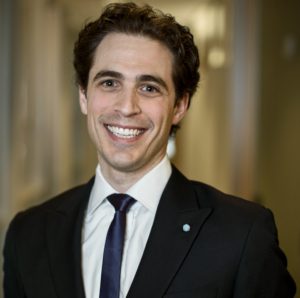
Ari Shwayder, faculty director of the Ross EMBA
I’m definitely still getting my feet under me, and I will say that the staff that are in place are amazing. I have relied on them gigantically to make sure that this all works.
We’re trying to do a few things: First, we want to increase the number of electives. Given the lockstep structure of the program, where students are on campus once a month, it’s not like in a full time MBA where you can just add a class and stick it on the schedule. So we’re having to be creative about ways to increase electives. That’s something we’ve heard from the students: They want different ways to dive a little bit deeper into some of the topics that we talk about. So that’s number one.
Then a bit of a longer term goal is trying to increase our international partnerships. We have some international experiences within our ExecMAP program (Multidisciplinary Action Projects). And just before COVID, we briefly started a partnership with ESADE Business School in Spain. We did one thing with them, and then COVID hit and the whole world fell apart. So we’re trying to pick that up again to develop other relationships with other schools. We’d like to offer more international opportunities to our EMBA students.
The third goal is to really build up the Los Angeles program. We’ve had reasonable enrollment there, and it’s been pretty steady, but I think we’re trying to build out Michigan Ross’ LA campus a bit more. We are looking to do more executive education in partnership with the exec ed folks here at Ross and things like that.
Walk us through the nuts and bolts of the Michigan Ross EMBA.
Ross’ EMBA is a lockstep, cohort based program lasting two academic years. There are two cohorts, one in Ann Arbor, and one in LA. The two cohorts really are the same other than location. It’s not that LA is a satellite, sort of stepchild campus. They take the same classes with the same faculty at the same time, and there’s lots of intermixing. We bring the cohorts together at different times.
The students are in-person, on campus, once a month for a weekend residency, and they have asynchronous online material in between.
So, faculty is flying to LA to teach the same classes that they are teaching in Ann Arbor?
Yes. The class that I teach in the program, which is the core economics of business class, they take in the fall of their first term. So I’ll teach it one weekend in Ann Arbor and then the next week I fly to LA and I teach it there.
The program is roughly divided into five terms. Broadly, for the first two terms, students are doing a lot of the core business courses – strategy, economics, accounting, leadership and people management, etc. Then in terms three, four, and five, there’s still some required classes, but that’s where more of the electives come in.
During term four, everyone does an ExecMAP project. We also bring them together in Ann Arbor for an elective week in August.
Are they able to take electives with students from other MBA programs?
Generally the executive MBAs are together and so the electives that they take are Executive MBA specific. The one exception to that is there are a small handful of classes in our executive education program which our EMBA students can take for credit. So there’s a little bit where they go outside sort of the walls of the MBA program, but generally they stay together.
What are the sizes of the two cohorts?
The overall class size over both cohorts is roughly 120 people a year. It’s usually roughly 40 in LA and 80 in Ann Arbor. Obviously it fluctuates up and down a little bit each year, but that’s sort of where we’ve been, ignoring the COVID years when things were a little crazy.
Do you see room for growth in those numbers?
In Ann Arbor, that’s definitely where we’re comfortable. Mostly, because 80 is what we can fit in one classroom. Splitting it up into multiple cohorts would take away some of the cohesiveness.
In LA, there definitely is some room for room for expansion. Certainly we would love to get up to 50 or 60 if we could find the good qualified people who are willing to go there.
Ross EMBA Class of 2025 Profile |
|||
| Cohort size (Ann Arbor + L.A.) | 116 | % Women | 26% |
| Average age | 39 | % International | 12% |
| Average work experience | 15 years | % C-suite, owners, presidents | 12% |
| Average management experience | 9 years | U.S. states represented | 22 |
| Average salary | $216,375 | Countries represented | 9 |
What do you think sets the Ross EMBA apart from its peer programs? What makes it special?
I think it’s a couple of things. One is that Michigan Ross is known for leadership. We have a lot of big name faculty who do the research on leadership, leading teams, and leading groups that Michigan is well known for. We try to build that into the EMBA program. In addition to all the classes they’re taking, we also have LDP, our Leadership Development Program, which underlines their entire time here. It’s not like they take one class in leadership and then that’s it. There’s constantly activities going on that help them think about that, do self reflection, and they’re always working in teams.
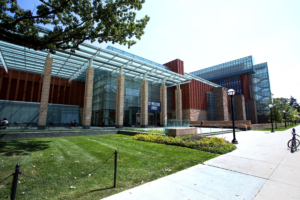
Michigan Ross School of Business
When this program was designed, we very explicitly chose not to have a specific industry focus or to have majors or anything like that. It’s not like a healthcare Executive MBA – although we do have lots of folks from healthcare – and it’s not a technology Executive MBA. We really do try to maintain our general management focus with the idea that we’re helping to train people who can lead any function in any industry. And, as they grow and advance into the C-suite, they’ll be able to look at the whole big corporation.
Related to that – and I think also related to our DNA as being a Midwest public university – is there really is a sense of collaboration and being part of a supportive community. Because we don’t have a specific industry focus, we have folks who come from all sorts of different industries: Health care, tech, finance, entertainment, a good number of military folks. We work hard, and I think succeed, at really building a sense of collegiality and collaboration. Students really do work together, help each other out, lean on each other and really build a sense of community. As an instructor, I love seeing that in class. There’s not that sort of hard charging, cutthroat and beat the other people sort of attitude.
That also extends to our big alumni network. The alums are still talking to each other and alums talk to current students, and so we really try to foster that. I have found that that extends to the faculty side also. Ross faculty are super willing to be collaborative with each other, share materials with each other, help each other out which makes it a great place to work. That is actually beneficial to the students because it means that I can try and connect stuff to what the marketing professors are doing, or strategy professors, or whatever.
We’ve done a bit of reporting lately on sustainability at Ross and the influence of the Erb Institute in the MBA program. Is that kind of content seeping into the EMBA program as well?
As I mentioned before, the full time MBA program can be a little bit more nimble by adding electives. We have had some electives such as Leading the Responsible Organization that touches on a lot of those sorts of things. And we have a new exec ed class around sustainable organizations that we hope to launch this spring. That will be another course that the EMBA students can take.
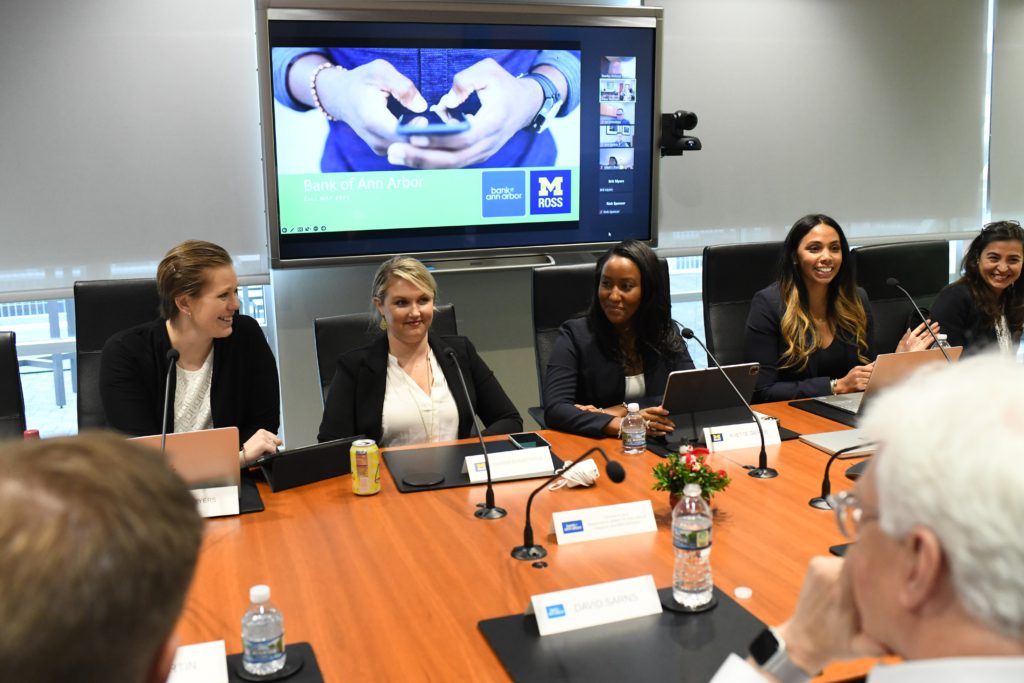
A group of EMBA students present their findings to the sponsor of their Multidisciplinary Action Project. Courtesy photo
Tell us more about the Executive Multidisciplinary Action Projects (ExecMAP) that the executive MBAs are required to do.
That is another big differentiator of our program versus other schools. Michigan has a long history of MAP; we’ve been doing it for 25 years, and all of our MBA programs at Ross do some version of it.
We have a whole Office of Action Based Learning that sources the projects, and a lot of our projects come from EMBA alums. Students get a list of all the projects that are available and rank their preferences. We then create teams of four or five students that spend all fall basically working on that project.
I think it’s very cool for a lot of our EMBA students to get a chance to work in a sector that is not what they normally do. So, you know, they work in tech and they do an executive MBA project in some manufacturing business or in healthcare or at a nonprofit. I think it gives them a really good exposure to a wide range of problems in sectors and also helps them try to really operationalize all the stuff they’ve been learning in class.
What are some recent program innovations or initiatives that you’re working on that you can share?
One of the things I mentioned before is trying to get some more electives into the program. We are also piloting some crossover programming with the online MBA program. That program runs residencies in various international locations a couple of times a year. So for example, in May, there’s a class on operational transformations that will go to Munich for a week. We’re actually piloting this year opening up some of the spots to our executive MBA students. If there’s interest in it, then maybe we could launch our own version.
We’re going to potentially also pilot adding some mini courses. The idea is to offer half credit classes on various interesting topics, like AI or healthcare, for which we have some expertise in our faculty. There might be a couple of weekend seminars where students could delve deeper into some specific topics.
Does Ross require an international residency or exposure for its EMBA?
This is a debate that we’ve had a little internally, but we actually don’t want to require international exposure because a lot of our EMBA students already are coming from international places or travel internationally for their jobs. And so it feels a little weird for us to force it.
But we want to provide them the opportunity to have that exposure if they want it. The main opportunity right now is through the ExecMAPs where a number of our projects are international. And as I mentioned, we had the exchange with ESADE Business School, so students had the option to go to Spain and take a class there for a week. That’s sort of how we’re approaching it is to try and provide more options for that without making it required.
Looking at the EMBA market and how it’s changing, do you see any opportunities and/or challenges for the Ross program specifically?
There’s a couple of things that come to mind. One, to go back to my point before, we are trying to maintain our focus on being a general management training program. I believe, and I think our faculty believes, that is a really important and very useful thing.
I think there is some pressure in some areas to launch very specific degrees. And, there’s the worry about whether those would siphon off, say, a student coming from health care who wants to go get a healthcare management degree, but actually would be really good in our program – both because they would learn a lot and also because they would contribute a lot to our program. I think that’s the challenge: To prove that it is a really worthwhile thing to be a generalist.
The other challenge, I think, and part of the reason we’re trying to increase enrollment in the LA campus, is to really increase the diversity of our class, especially from a function and geographic location point of view. The Ann Arbor program draws people from all over, but mostly from the Midwest and the East Coast. We do get a reasonable number of health care people because there’s lots of folks like at the various hospitals that come. We also get automotive manufacturing executives, which is great.
But being in LA also gives us a chance to tap into the tech industry and the entertainment industry. We get a lot of military folks from the naval bases down there. So just trying to maintain that diversity is really beneficial for our program.
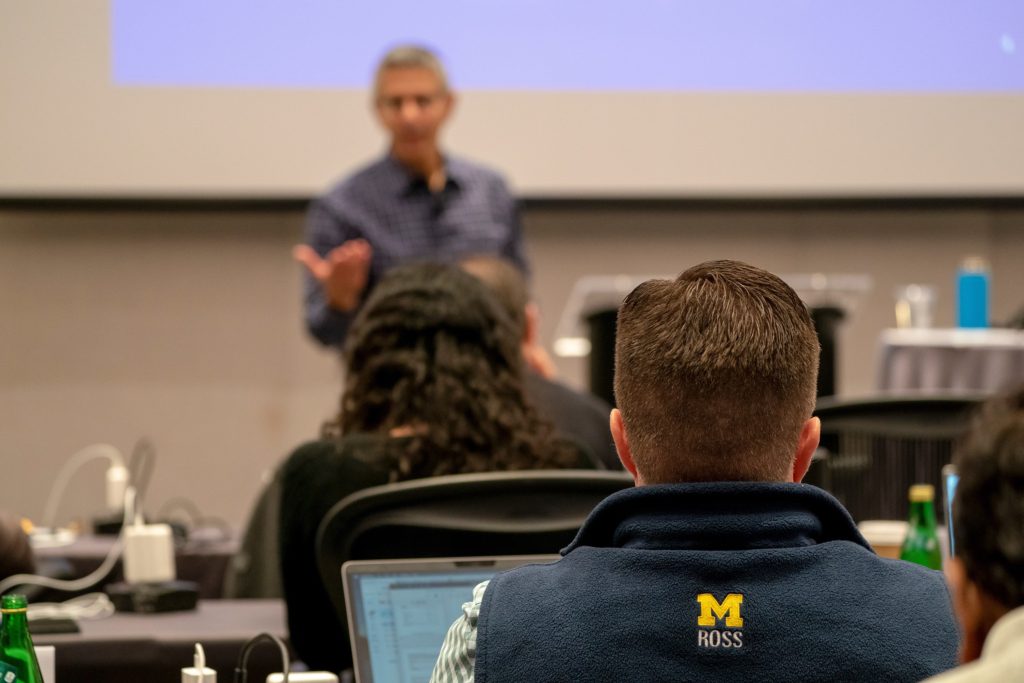
Students attending a class at the Michigan Ross L.A. campus.
Can you explain a little more about how Los Angeles became the second location for the EMBA?
We wanted to expand our footprint to increase geographic and industry diversity and perspectives. L.A. is a cultural center, and we wanted to have a presence there. Another part of geography is that, outside of Michigan, California has the largest concentration of U-M alumni. There was and continues to be a built-in alumni community in that region of the country.
Looking ahead in 2024, Ross will be offering executive education classes in L.A. for the first time. Those have been solely offered in Ann Arbor until now.
How do the two cohorts interact?
We definitely make an effort to make the students feel like they are all part of one program. It’s two locations, but it’s not two separate programs. For example, from the very beginning, everyone comes to Ann Arbor for orientation week in the summer. We also bring them together in August between the first and second year for electives week and both cohorts all take classes together. And the ExecMAP teams are also across cohorts.
Anything else you’d like to add?
The last thing that I’d say is that the students are great. I really love the EMBA students; They all come from diverse places and functions and industries, and so they’re just really fun to be with. Some folks are really technically oriented because they’re from engineering, and some haven’t taken a math class since high school 20 years ago, but they all want to be there and so they really do help each other out.
It’s really cool to see what they go on to do. The promotions that our students get right after or within a couple of years of graduation are really impressive to me. The stat our marketing folks sent me is that within three years of graduation, average salaries are going up by $125,000. That is a big number, and almost pays for the program in and of itself. Beyond that, they are just impressive people who are fun to talk to and be around.
DON’T MISS THESE STORIES IN OUR EMBA SPOTLIGHT SERIES:
- CAMBRIDGE JUDGE OFFERS MORE FLEXIBILITY WITH ITS NEW GLOBAL EMBA
- AFTER PANDEMIC PAUSE, WISCONSIN SCHOOL OF BUSINESS LAUNCHES NEW HYBRID EXECUTIVE MBA
- ASU CAREY’S EMBA OFFERS A LEADING CONCENTRATION IN THE BUSINESS OF HEALTH CARE
- TEXAS A&M UNIVERSITY’S MAYS BUSINESS SCHOOL EXECUTIVE MBA
- SCU LEAVEY’S EXECUTIVE MBA IN THE HEART OF SILICON VALLEY
- THE UNIVERSITY OF TEXAS AT AUSTIN MCCOMBS EXECUTIVE MBA
- UW FOSTER’S PROGRAM BRINGS STUDENTS TO SEATTLE’S TECH MECCA
- EMORY GOIZUETA’S PURSUIT OF FLEXIBILITY
- TCU NEELEY’S PROMISE: ‘ROI STARTS MONDAY’
- AT UMN CARLSON, A NEW CURRICULUM & HYBRID OPTION
- HOW CORNELL JOHNSON’S PROGRAM IS UNIQUELY SUITED TO THE MOMENT
- THE BENEFITS OF RUTGERS’ ACADEMIC-RUN EMBA POWERHOUSE





Questions about this article? Email us or leave a comment below.